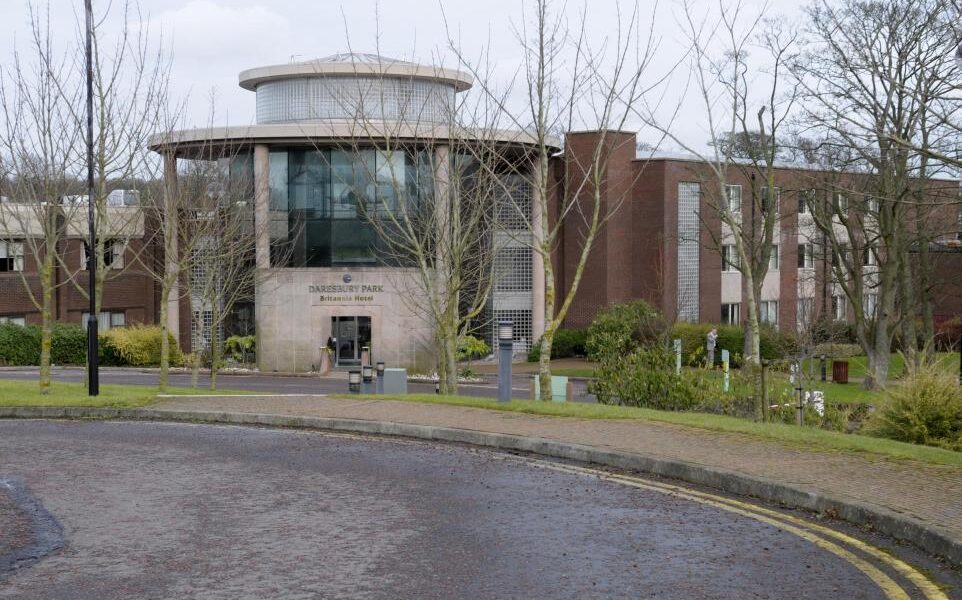Jahangir Mohammed dissects the fallacy of populist anti-migrant politics in the Runcorn and Helsby by-election run-up.
The Runcorn And Helsby By-election: Refugees, Hotel Or Prison?
As voters in Runcorn and Helsby prepare to head to the polls on 1 May 2025 for a crucial by-election, one issue has dominated the conversation: the Daresbury Park Hotel and its use to house asylum seekers. This constituency has low numbers of migrants and Muslims, but with many socio-economic challenges. It has an ageing population in need of care and public services. Yet the hotel has become both a political football and a symbol in the national migrant debate and the rise of populist white nationalist politics.
From Conference Venue to Controversy
The Daresbury Park Hotel, once a busy conference centre just off the M56, became a holding site for asylum seekers starting in 2019. The building is owned by Britannia Hotels and had fallen into a state of decline years before the pandemic. Plagued by low ratings and financial losses, the hotel was part of the broader Britannia portfolio, struggling to fill rooms. When the COVID-19 crisis struck in 2020, the Home Office, through its private contractor Serco, rapidly expanded the use of underoccupied hotels like Daresbury Park to manage the sharp rise in asylum seekers needing temporary accommodation.
By mid-2020, approximately 200 asylum seekers were living at Daresbury Park, out of a capacity of up to 425. With full board provided, those staying there receive a reduced weekly allowance of just £8.86, compared to the standard £49.18 for those in self-catered accommodation. Described by residents as “a prison,” the hotel’s isolated location on a business park and restrictive rules—curfews, no cooking facilities, poor food, and limited healthcare access—have taken a serious toll on the mental health of residents. The media and politicians are not interested in their story, only in dehumanising them further.
Safety and Far-Right Harassment
Threats from outside compound conditions inside the hotel. In August 2020, the white nationalist group Britain First stormed the premises, filming themselves banging on doors and intimidating residents. The event triggered fear among asylum seekers, many of whom were already traumatised by past persecution. Yet such incidents are not isolated. Across the country, asylum seeker hotels have been flashpoints for protests, often fuelled by far-right misinformation that residents are “living in luxury” on public money. No one talks about the benefits to the private companies running these refugee housing programmes or the underused hotels they are sustaining.
A Community with Few Migrants
This furore is unfolding in a constituency with very few migrants. In Runcorn (Halton Borough), 93.2% of residents were born in England, and only 0.6% identify as Muslim, far below the national average. There appears not even to be a mosque in the area, maybe that’s a blessing because it might also have become a target for migrant rage, as in Southport last year. Helsby, which is part of the more rural Cheshire West and Chester, shows similar figures. Yet the asylum hotel has sparked an outsized political storm in a place largely untouched by immigration pressures.
Real Problems, Little Airtime
The backdrop of long-term socio-economic hardship complicates the situation for many locals and observers. Runcorn has one of the highest economic inactivity rates in the North West due to long-term illness (6%). The borough ranks among the most deprived in England, with high child poverty, below-average life expectancy, and strained public services. Even in more stable Helsby, issues like NHS waiting times, school funding, and inadequate infrastructure remain significant concerns.
And yet, with a by-election looming, the focus on the Daresbury Park Hotel has eclipsed those issues.
Election Politics and the Weaponisation of Migration
Labour’s candidate Karen Shore—previously known for a more inclusive stance on refugees—made closing the hotel a centrepiece of her campaign. Her social media campaign promised to “shut down” the refugee hotel, citing it as a failure of the immigration system. This came amid rising support for Reform UK, whose hardline anti-immigration stance has attracted disillusioned voters. The government has now announced that the hotel will indeed be closed. Labour’s pivot appears strategic—designed to blunt Reform’s appeal—but it has drawn criticism for echoing right-wing rhetoric rather than challenging it.
Campaign materials from both Labour and Reform have emphasised immigration as a key issue. Meanwhile, issues like employment, housing, a rapidly ageing population, and NHS services have received far less attention on the campaign trail despite being more immediate concerns for many voters.
Conclusion: Hotel or Prison, and What About the Rest?
The Daresbury Park Hotel was never meant to be permanent. But its use has exposed wider failings: a broken asylum system, underfunded support networks, and a media-political climate that scapegoats and dehumanises the most vulnerable while ignoring structural problems. The media are not interested in the human beings and their real stories inside the hotel. Whatever happened to real objective journalism? For the asylum seekers inside, the hotel is a place of waiting, isolation, and uncertainty. For politicians, it’s become a convenient political symbol guaranteed to deliver votes. And for the people of Runcorn and Helsby, it risks becoming a distraction from the real work of fixing what’s broken, far beyond the hotel’s walls.



Leave a Reply